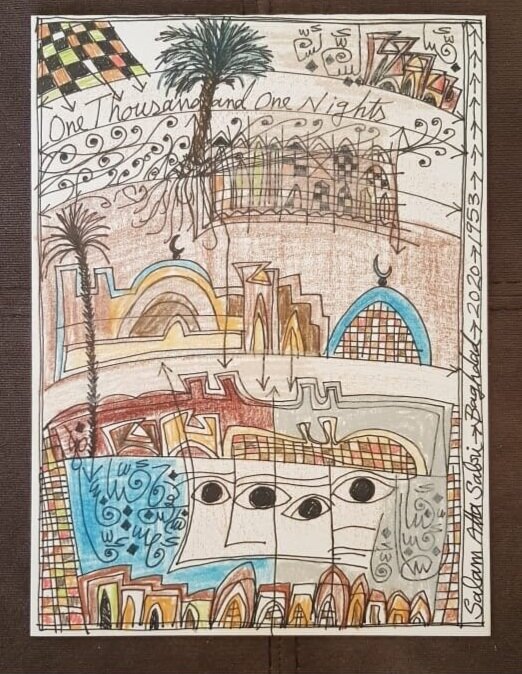'One Thousand and One Nights:' Salam Atta Sabri's Arabian Nights
In One Thousand and One Nights, King Shahryar’s anger at discovering his wife’s infidelity leads him to marry and execute a new woman every day. Shahrazad devises a plan to save herself, and other women, from the King’s misogynist anger. Each night she tells the King entertaining stories, leaving them unfinished so that the King lets her live until the next day, until he eventually abandons his course of action.
Iraqi artist Salam Atta Sabri has produced his own One Thousand and One Nights set in Baghdad, a response to the Coronavirus pandemic that has forced us to live from day to day, in an extended period of uncertainty and prolonged waiting like Shahrazad.
Born and raised in Baghdad, Salam Atta Sabri (b. 1953) lived in the USA and Jordan for 16 years before returning to Baghdad in 2005 where he became director of the Museum of Modern Art from 2010-2015, which had lost 75% of its collection to looters in 2003. His work deals directly with the experience of returning to a country dramatically changed by conflict. Atta Sabri is perhaps more adept than most artists to produce art without the supporting structure of the art world. His intensely personal works present an artist who has striven “to create under the shadow of a crumbling arts infrastructure.” Despite working in the arts all of his life and initially training as a ceramicist, Atta Sabri kept all of his own works of draughtsmanship (some 300 drawings) out of the public eye until exhibiting a selection of these ‘Letters from Baghdad’ at the Iraq Pavilion at the 56th Venice Biennale. Atta Sabri’s latest series is similarly made during a period of confinement, although this time it is a global experience rather than one specific to Iraq.
“Everything is upside down. Our building during the siege of Virus Corona tells stories of a thousand and one nights”
Many of the tales in One Thousand and One Nights were based on important historical figures from Baghdad during the classical Abbasid period, the ‘Islamic Golden Age.’ Atta Sabri develops this connection between Baghdad and the original collection of medieval folktales by setting his story there and drawing on his own experience of living in the city. Of his contemporary version of the Arabian Nights, Atta Sabri writes:
“We are all forced into the house and do not know how long we stay in the apartment. So I remembered to start drawing the story of a thousand and one nights, because it has become a contemporary subject where Shahrazad tells her own stories to pass the time. Like her, we do not want to face unknown death [by King Shahryar or Coronavirus].”
RUYA MAPS will be exclusively sharing Salam Atta Sabri’s ‘One Thousand and One Nights’ on our Instagram stories, follow us on @ruyamaps.

































